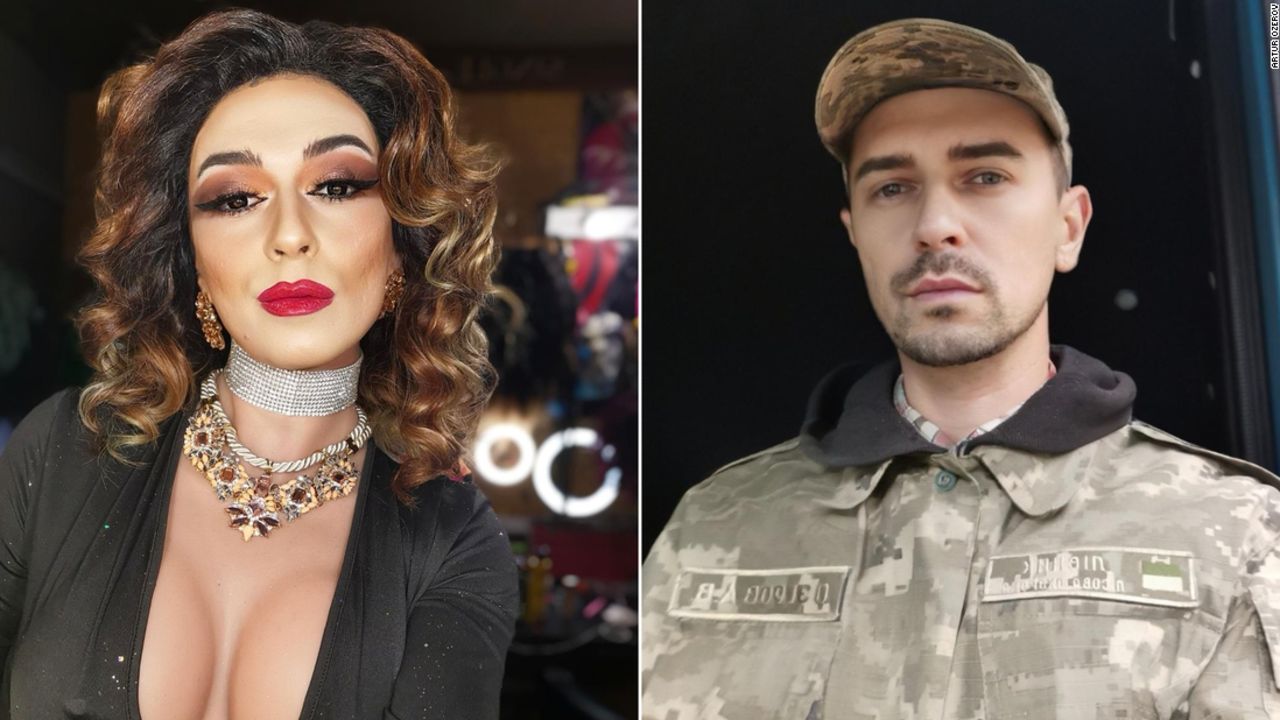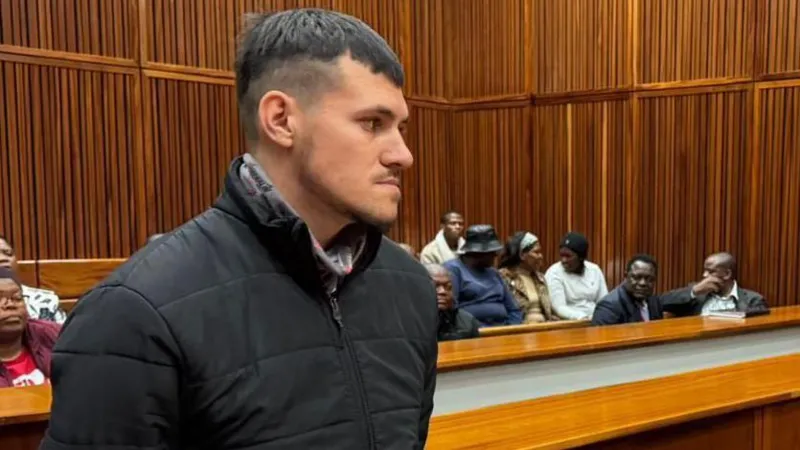‘I wanted to resume my transition at all costs.’ Trans Ukrainians uprooted by war struggle to continue treatment

The best day of Eric’s life came just days before the worst.
After years of waiting, dozens of tests and a two-week stay on a psychiatric ward, Eric was finally getting his first testosterone shot. Eric is a 23-year-old transgender man from Ukraine. Assigned female at birth, he says starting hormone therapy was a major step in his quest to become his true self.
“It was utter happiness. I was euphoric, it was the moment that I’ve been waiting for for so long,” Eric, who asked for his last name to not be used because he is concerned for his safety, told us in Chisinau, Moldova, in July.
But just days after Eric had what should have been the first in a series of testosterone injections administered at a clinic in Kyiv, Russia invaded Ukraine. Everything changed.
“The clinic had closed because of the danger of airstrikes. I had the testosterone, but no way of getting [it administered]. I didn’t have the needles and there were huge shortages of everything in pharmacies, even the most basic stuff, because obviously, during the war, there’s a big need for things like syringes,” Eric said.
Russia’s brutal assault on Ukraine has upended the lives of millions of Ukrainians. But for Eric and many other trans people, the war has also made it much more difficult to be who they are.
Many lost access to vital medication and psychological help. Some were completely cut off from their communities and forced into spaces where LGBTQ people were not welcome, according to the Commissioner for Human Rights at the Council of Europe.
Bureaucratic problems, such as having personal documents issued under a different gender, can put them at extra risk.
The Ukrainian transgender rights group Cohort says it has helped more than 1,500 people since the start of the war, assisting them to move to safer areas and helping them pay their bills. The NGO also works with shelters to make sure they have the basic supplies they need.
But the number one request Cohort has been receiving in recent months is for help getting hormone therapy, or HRT, according to Anastasiia Yeva Domani, Cohort’s co-founder and executive director.
HRT can be used by trans women, trans men and non-binary people to make their physical appearance more aligned with their gender identity. The drugs alter the body’s testosterone or estrogen hormone levels and trigger physical changes that normally occur during puberty.
As with other medicines, Ukraine’s supplies of hormone drugs have been severely limited since the beginning of the war. Supply chains are often interrupted by fighting and buying from abroad is increasingly difficult because the collapse in the value of the Ukrainian currency has made imports a lot more expensive, Domani said.
“Some people started substituting for cheaper versions of the products, or they lower their dose to try to stretch [their supply] out. Very often, they don’t speak to their endocrinologist about this, which is dangerous,” she added.
Hormone therapies are typically prescribed in gradually increasing doses with careful monitoring until a stable hormone level is reached, according to Gendered Intelligence, a UK-based charity and grassroots organization supporting trans people. Different people may require different doses, because everyone responds differently to the therapy.
“Having a safe and stable hormone level is important because hormones govern a wide range of bodily functions, from brain activity to bone development,” Cleo Madeleine, the spokesperson for Gendered Intelligence, told CNN.
“If a trans person is forced to lower their dose below the prescribed amount because of medicine shortages or disruption to supply lines – as we have seen in Ukraine – it could cause mood instability, aggravate gender dysphoria, and even lead to more serious health issues.”
The situation in Ukraine has become so desperate, Domani said, that some people, rather than face the potential effects of withdrawal, have turned to self-medicating with homemade substitutes.
“There are people who have been making their own HRT at home and they sell it through Telegram channels and things like that,” she said. “They are definitely not safe.”
Buying cheaper drugs online can also be extremely risky.
“We strongly discourage self-medication with irregularly sourced drug treatments. Internet sourced hormone therapies can be dangerous and are sometimes contaminated,” the UK’s National Health Service (NHS) warns.
Eric fled Ukraine shortly after the beginning of the war. “I thought I was going to die there. The alarms, the explosions all the time, the sirens were going off 20 times a day, I was afraid for my life,” he said.
With his passport still under the name he was given at birth, Eric was allowed to cross the border into Moldova, where he was safe from Russian bombs. Ukraine’s government barred most men of fighting age from leaving the country soon after the war broke out.
At first, Eric was able to find a doctor who administered the shots he brought with him from Ukraine. But once he ran out of those, he was left without medication.
Some of the effects of the earlier treatment started to reverse – for example, his menstrual cycle came back after stopping earlier in the process and he experienced mood swings, he said. Worn out by stress and uncertainty, and traumatized by the war, he became emotionally numb, he said.
‘An active movement’
While still lagging behind many western European countries, Ukraine has taken steps in recent years to become more supportive of the LGBTQ+ community, for example by adopting broad anti-discriminatory laws. This is partly because of Kyiv’s desire to join the European Union, which requires future member states to adopt laws protecting minorities.
But several people have also told CNN that Russia’s assault on Ukraine has prompted an even greater push for equality and inclusion, because Ukrainians realized their values were also under attack.
The Russian government has become increasingly homophobic under President Vladimir Putin. In 2013, it passed a law banning “propaganda of non-traditional sexual relations” among minors, which the European Court of Human Rights ruled to be discriminatory and in violation of human rights.
In November, the Russian parliament expanded the law to ban all Russians from promoting or “praising” homosexual relationships or publicly suggesting that they are “normal.” According to Human Rights Watch, the new law would also “isolate children from any information on alternative sexual orientation and gender identity, including gender transition.”
Putin has made no secret of the fact that his assault on Ukraine was partly motivated by Kyiv’s desire to align itself more closely with the Western world and its values. Alluding to Western acceptance of the LGBTQ+ community, he accused the West of “imposing attitudes that are directly leading to degradation and degeneration, because they are contrary to human nature.” The top priest of the Russian Orthodox Church and Putin’s close ally Patriarch Kirill went as far as suggesting gay pride parades were part of the reason for the war in Ukraine.
While trans Ukrainians still experience negative attitudes in some spaces, for example in shelters housing families, according to COHORT, the discriminatory Russian rhetoric has pushed more Ukrainians to speak up.
“Never before would we get 25,000 signatures on a petition to support same sex marriage and have the president saying he is working on legalizing civil partnerships, including same sex partnerships,” Domani said. “The Istanbul Convention was ratified in July, which is something the LGBTQ+ community has been really hoping for for a long time,” she said referring to the international treaty to protect women against violence.
Civil servant Arthur Ozerov told CNN he experienced this shift in attitudes first hand when he decided to come out as an LGBTQ+ person and an occasional drag queen earlier this year.
“I was pleasantly surprised. I didn’t have any problems at all. My colleagues at work, even those who used to be homophobic, treated me well,” he said.
“The attitude of Ukrainians towards LGBTQ+ people has changed dramatically since the beginning of the war, there is an active movement now regarding their rights and freedoms,” he added.
Ozerov said he believed this was partly because like himself, many people have come out as LGBTQ+ while being directly involved in the war effort, from fighting on the front lines to volunteering – encompassing anything from helping distribute supplies to making petrol bombs and rebuilding – and helping the people worst impacted by the war. Ozerov himself wears a uniform when working with the military in his capacity as a civil servant.
But there is another reason for the more liberal attitudes, he said.
Being under attack from Russia, which ostracizes the LGBTQ+ community with its laws, has made many Ukrainians realize they want to support European values that promote inclusion and equality, he said.
-cnn







